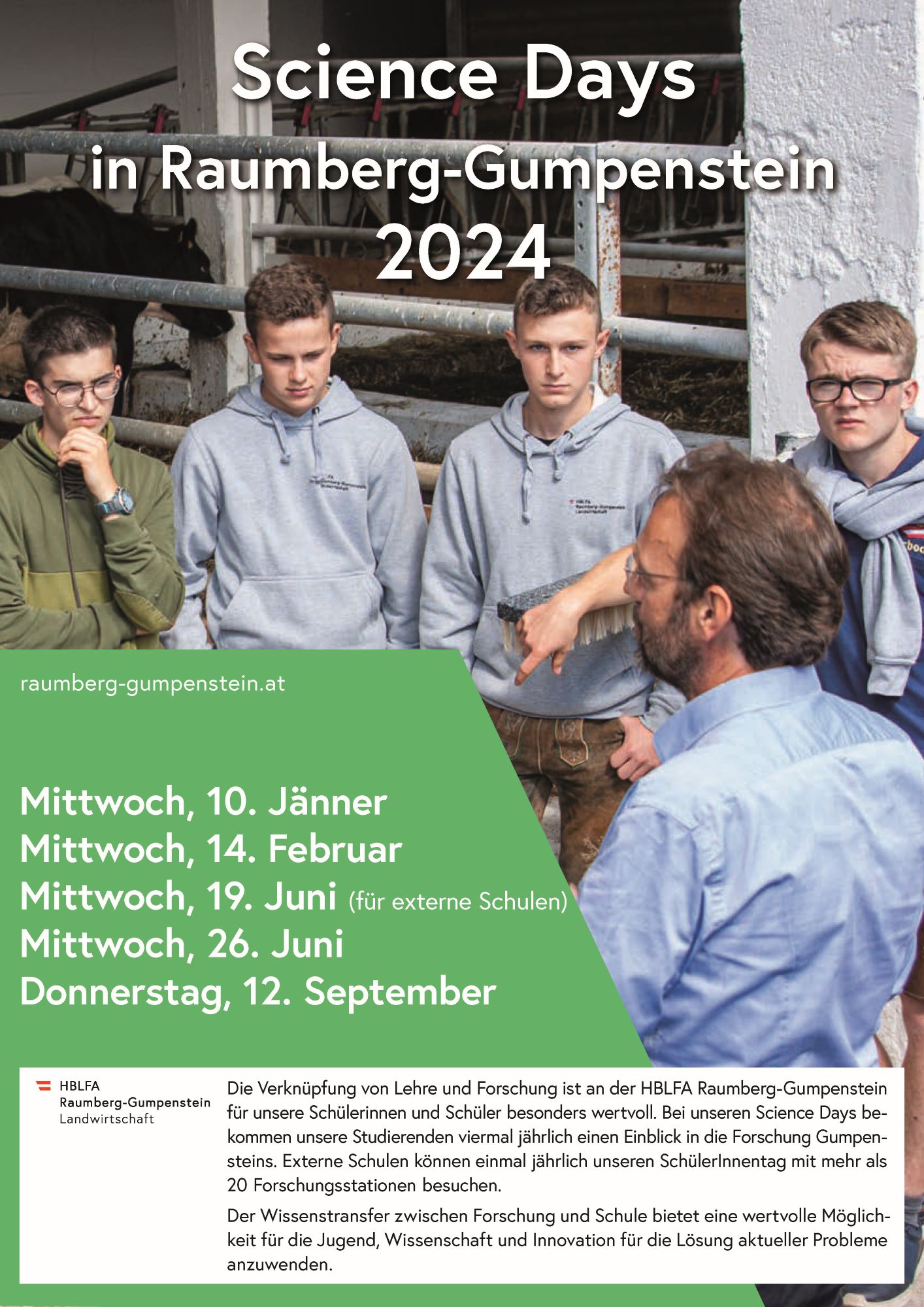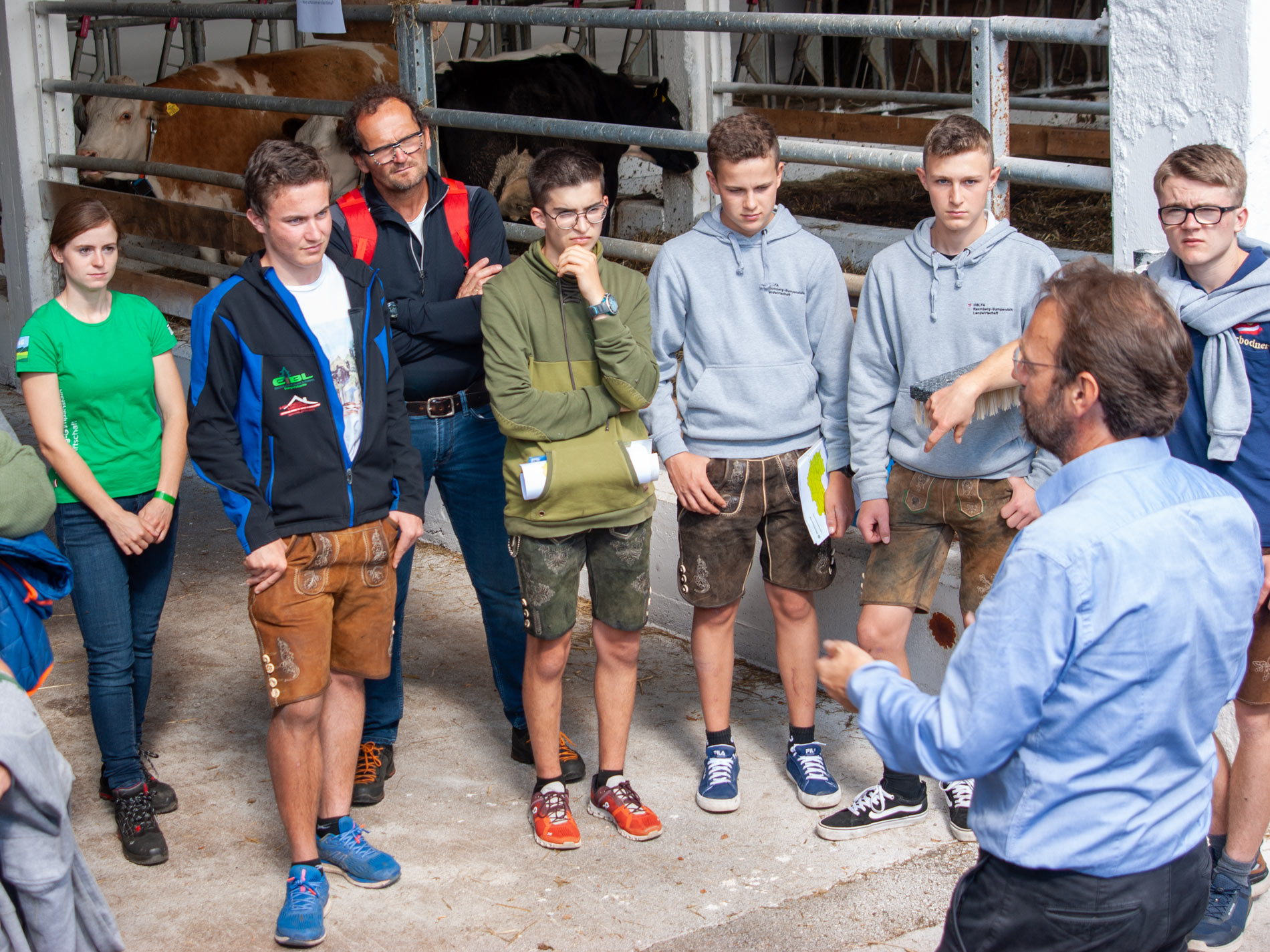The following topics were addressed at Science Day in September 2024:
at the Moarhof in Trautenfels (5L & 3A):
- Organic field feed
- Organic grassland
- Pasture systems and strategies with cattle and
- Herd protection - sheep, goats
in Wels/Thalheim (5U)
- Organic pig farming Reproduction on the pig farm
- Rare farm animal breeds (AI and embryo transfer)
- EU law using the example of organic farming
- Endo- and ectoparasites in pigs
in Gumpenstein (2A, 3L, 3U):
- Inventory survey of grassland - inventory
- Stock assessment of grassland - yield
- Analyzers
- Indicator plants in grassland
- Cattle, methane and climate change
- Ways to detect feeding and husbandry errors - milk ingredients
- Adapting cattle feeding and water supplies to climate change
- Ways to detect feeding and husbandry errors - animal observation
- Manure, compost
- Cattle behavior & application to stable construction
- Emissions and immissions from livestock farming
Handouts for Science Day September
Pictures from Science Day September
We would like to thank everyone who made this unforgettable day possible for our students.
Science Day June 2024
The following topics were presented clearly and practically in 65-minute units on Science Day in June 2024 - all handouts can be downloaded free of charge below:
in Lambach/Stadl Paura:
- Organic agriculture laboratory (TKG, germination...)
- Organic food crops: legumes and sweet potatoes
in Wels/Thalheim
- Castration of piglets under general anesthesia on an organic pig farm
- Biodiversity in danger
in Gumpenstein:
- Soil science
- Digitization and remote sensing in grassland
- Focus on quality - beef fattening and meat
- Meat laboratory and beef quality
- Lysimeter and nutrient leaching
- Nutrient efficiency in cattle feeding for environmentally friendly livestock farming
- Quality management in the seed sector - experimental field
- Cattle fattening systems, fattening and slaughter performance
- Energy costs and climate footprint
- Climate impact research in grassland (plot experiments)
- Stable construction, approval process, building law
- Water laboratory - water parameters
- LCA using the example of Farmlife (double unit)
- Practical emission calculation for cattle
All handouts for Science Day in June 2024 free to download
The following topics were worked on in groups in February 2024:
- Digitization and remote sensing in grassland
- Endo- and ectoparasites in cattle, pigs, sheep, goats
- New farrowing pens in Austria (findings from the Pro-Sau project)
- Climate impact research in grassland
- Lysimeter and nutrient leaching
- Nutrient efficiency in cattle feeding for environmentally friendly livestock farming
- Agriculture and neighborhood
- Procedure for the renewal of grassland stocks
- Post-fossil era - necessity and solutions
- Stable construction, approval process and building law
- Barn climate and animal health in livestock farming
- Animal husbandry 4.0 digitalization and networking (Precision Livestock Farming)
- Rethinking fertilizer management
- Land use and natural hazards
documents prepared by our scientists be downloaded free of charge for everyone They offer interested parties and students a short, current overview of the respective topic and can also be used in other schools free of charge in lessons.
Science Day handouts - February 2024
Impressions from Science Day - February 2024

Handouts for Science Day - January 2024
Impressions from Science Day in September 2023 (Gumpenstein & Moarhof)
Handouts June
Handouts January
4th Science Day in Raumberg-Gumpenstein
The 4th Science Day for the students of the HBLFA Raumberg-Gumpenstein on Wednesday, January 11th, 2023 As part of the Science Day, our students came to the research areas and received a direct, practical insight into current agricultural research and testing.
Cinematic review by Mag. Alexandra Mattarollo
The students from 2 U - Laura Rießner and Thomas Rauchwald - give a brief review of Science Day on January 11, 2023:
As part of this year's Science Day, we were able to attend various lectures on the subject of agriculture. The lectures took place in the HBLFA Raumberg or in the Gumpenstein research area. At the beginning we visited a specialist ward run by Dr. Thomas Guggenberger on the subject of “Agriculture Specialist Atlas”. He introduced us to the specialist atlas he helped design and we learned a lot about agricultural statistics and their importance. Immediately afterwards, Dr. Andreas Steinwidder explains the topic of “organic developments and the comparison of the organic and conventional markets” in more detail. We were allowed to actively participate in his self-created survey, the answers to which were then discussed together. After a short snack break we visited Dr. Elfriede Ofner-Schröck and her assistant in Gumpenstein. There the topic “Behavior of cattle and its application to stable construction” was explained to us. We were allowed to assess the animal welfare situation of the cows in the stable. After lunch we visited Mr. Josef Kaufmann, where we learned a lot about the methodology of gas chromatography and how these devices can be used to measure the acidity of silage, for example.
We really enjoyed the day and learned a lot of new things.
We would like to thank everyone involved for their many efforts and thoughts in the preparation and follow-up, for the interesting questions and the discipline in implementation.
3rd Science Day in Raumberg-Gumpenstein
In order to better combine teaching and research and to give our students direct insights into current research work , we have developed our Science Days. We take the level of knowledge of our students into account and present all of our research areas to them in a practical way as part of their 3 or 5 year school career.
The researchers prepare specialist stations , summarize the topics succinctly and actively involve the students in the respective topic. For example, the results are tasted, measured, collected, documented, evaluated, thought about and discussed.
The prepared documents are bundled be downloaded free of charge for everyone below They offer interested parties and students a brief current overview of the respective topic and can be used in lessons, for example.
Highlights from September 14, 2022
On Wednesday, September 14th, 2022, six classes are divided into Science Day:
The fifth environmental class the branch of our organic institute in Wels , where they dealt with the topics
- organic pig farming,
- artificial insemination /embryo transfer,
- EU law using the example of organic farming and
- parasites in sheep and goats.
The fifth agricultural course and the third advanced course to our organic institute at Moarhof in Trautenfels . They have one there
- Receive an introduction to organic field feed and organic grassland In addition there are also
- grazing systems and strategies as well
- Herd protection for sheep and goats has been presented in theory and practice.
The second advanced course and the third years in Agriculture and Environment come to neighboring Gumpenstein . For them, topics from the
- Grassland area (stock survey and assessment, fertilizer guidelines),
- animal health aspects (metabolic diseases in dairy cows, udder health, calf diseases),
- Environmental issues (energy saving potential on the farm, cattle methane and climate change, emissions and immissions from livestock farming) as well as that
- Behavior of cattle and the
- Handling of manure and compost has been implemented in practice.
We would like to thank everyone involved for the preparation and follow-up, for the interesting questions and the implementation discipline.
HBLFA Raumberg-Gumpenstein - School for life & research for the future !
Impressions from Science Day
Hand-outs from our speakers
Handouts from our speakers February 2023
Handouts for Science Day - September date 2022
Handouts for Science Day - June 2022
Read more about the first Science Day
MichelleStreitzer and Georg Weinhandl from the 3ALG class provided us with the film As part of a project, you incorporated our first Science Day in February from your perspective. Thank you very much for that...
































































































































